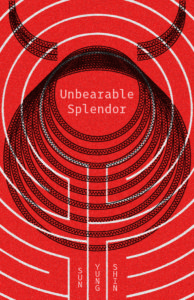The word myth is used to mean both a falsehood and a story at the foundation of life. Sun Yung Shin’s Unbearable Splendor (Coffee House Press) is a collection of lyric essays, poetry and autobiographical narrative about being made and unmade, found and abandoned, at once. “In the beginning of the world there was nothing…all you could hear was the sound of nothing expanding and nothing contracting,” Shin writes in the essay “The Other Asterion, or The Minotaur’s Sacrifice (A Story).” In the collection’s first essay, “Valley, Uncanny,” the speaker relates herself to this idea of nothingness, concluding that she is not a void but gravity sucking everything inside itself, carrying “a train of holes—holes of smoke, holes of sky. Holes of water, holes of rice milk. I was an uncanny guest.”
Personified black holes are one of many science fiction elements in this collection that invites the reader to consider the experience of a human who arrived at this life unnaturally, or supernaturally. Shin, who is a Korean adoptee, seeks to understand what other proximities are vital to our understanding of self, and how they relate to the the boundaries and possibilities of language. Can one understand life if one is separated from language? Was there life before language? In the essay, “In Exactly Like You,” she writes,
Abandoned and then re-en-familied, re-kinned, an adoptee is many things, including, I would posit, both a form of ongoing transit and a re-territory, a re-form. This form takes on different meanings, depending on the place, the language, and the people looking, listening. If our form is different, if we are no longer recognizable, if no one speaks our language, who are we?
It is in “Valley, Uncanny” that we first encounter Shin’s methodical approach to understanding sorrow of the most primordial kind. Here, as in the rest of the book, the reader is asked to consider what is known to us, in relation to the vastness of what is unknown or strange. She gives us a text illustrated with all variety of evidence: ephemera, records, illustrations, and maps to support her case. Using mirrored charts, one in English and one Korean, to introduce the essay, the author references roboticist Masahiro Mori’s concept of the uncanny valley, which posits that people experience disgust as they observe replicas with increased human likeness. Shin is at once the human and the replica, observer and the observed, the repelled and the repellant. Throughout the collection, she uses the library’s full card catalogue, pulling seemingly wildly incongruent subjects to achieve an eerie sense of connection. The wispy, ghost-like sinew this gives to the ideas seems appropriate because we are dealing with supernatural concepts. Shin insists you trust her as a documentarian and that you trust, as she does, that language is elastic—a multiuse tool.
 This book is categorized as Essay/Poetry and requires dexterity with both emotional and analytical reading. To categorize this book as either would restrict the ways it approaches its subject. At once lyric, dense, and exhaustive, her hybrid writing often employs poetic line breaks and varied spacing to allow words and punctuation to fully occupy the possibility of the page. In other places, it needs the full line and the essay form to fully interrogate complex topics, and seems to burst at the seams with its effort to understand the ineffable. At times the author leans into sound and lists, “breath, brush, breath, bath, last. My enemy, my house, my horse, my hound,” and encourages the words (and their consonant sounds) to do double duty, to communicate meaning and tone. One essay where the tension between the lyric and the narrative is particularly taut is “One Hundred Days in the Cave,” which considers ancient Korean history, Shamanism, and the author’s own beginnings in Seoul in the Spring of 1975.
This book is categorized as Essay/Poetry and requires dexterity with both emotional and analytical reading. To categorize this book as either would restrict the ways it approaches its subject. At once lyric, dense, and exhaustive, her hybrid writing often employs poetic line breaks and varied spacing to allow words and punctuation to fully occupy the possibility of the page. In other places, it needs the full line and the essay form to fully interrogate complex topics, and seems to burst at the seams with its effort to understand the ineffable. At times the author leans into sound and lists, “breath, brush, breath, bath, last. My enemy, my house, my horse, my hound,” and encourages the words (and their consonant sounds) to do double duty, to communicate meaning and tone. One essay where the tension between the lyric and the narrative is particularly taut is “One Hundred Days in the Cave,” which considers ancient Korean history, Shamanism, and the author’s own beginnings in Seoul in the Spring of 1975.
Through its many layers of reference, at its heart, Unbearable Splendor is an exploration of the loss of something never really held, the loss of potential experiences and intimate connection. Shin gives the reader a lexicon to navigate the complexity of the transracial adoption experience. In “Harness,” she defines water as a, “Graveyard of names. Deck of cards. Stone teeth. Leaks and bursts, a balloon, a boat, a floating thing.” Shin insists that we embrace a new, unfamiliar understanding of words in order to experience the concepts she is forwarding. The narrative circles around a family registration document in which we read over and over: there’s no record next to family chief, next to father, next to mother. Shin writes that she is a “Family of one. At seven months old, I become the chief and sole member of (my new branch of) the Shin family.”
In her collection, Shin seems to be asking, how does one honor the dead, even when they are unknown to us? The title Unbearable Splendor refers to Antigone, the Greek heroine punished for mourning the death of her family, who Shin argues is the “original cyborg.” The cyborg, an echo signaling back to the idea of the uncanny, stands in for the adoptee and can be plotted on the sloping line we get from Mori. Throughout the text, she compares herself, the adoptee, to other near humans—aliens, robots, Minotaurs, manikins, clones, surrogates—and considers the repulsion that comes from “a hybrid creature of excess,” ”a thing that exceeds the sum of its parts.” Using the image of an almost human, a nearly passable imitation of life, Shin suggests connection is challenging because of something elemental. Like Antigone, like the adoptee, Shin’s reader is immured in a cave of text—alone, in the dark, feeling at the walls, forced to consider fidelity, familiarity, the familial and the consequences of loyalty.
 The collection’s longest essay, “The Other Asterion, or, The Minotaur’s Sacrifice (A Story)” begins with a quote from Jorge Luis Borges’s short story, “The House of Asterion,“ the story of a minotaur interned in a house as big as the universe. In the voice of a minotaur, Shin writes her own house/prison/cave/universe in this essay. In the first of five parts, the reader moves from the big bang, “a tremendous force… bending the nothing within itself, a spring or a bow being drawn inward further and further;” to the creation of the earth, “the land choked with lava, hot then hard. The evolution of the eye;” to a prison of the universe and its guard; to an image of the moment before the world disappears, “a blinding dazzle of a blade and a small ball of fine thread.” In this essay, Shin accomplishes an amazing feat by confusing our sense of time and scale in order to craft a feeling of infinitude while enacting creation mythology.
The collection’s longest essay, “The Other Asterion, or, The Minotaur’s Sacrifice (A Story)” begins with a quote from Jorge Luis Borges’s short story, “The House of Asterion,“ the story of a minotaur interned in a house as big as the universe. In the voice of a minotaur, Shin writes her own house/prison/cave/universe in this essay. In the first of five parts, the reader moves from the big bang, “a tremendous force… bending the nothing within itself, a spring or a bow being drawn inward further and further;” to the creation of the earth, “the land choked with lava, hot then hard. The evolution of the eye;” to a prison of the universe and its guard; to an image of the moment before the world disappears, “a blinding dazzle of a blade and a small ball of fine thread.” In this essay, Shin accomplishes an amazing feat by confusing our sense of time and scale in order to craft a feeling of infinitude while enacting creation mythology.
All together, the pieces of Unbearable Splendor work together to form a sort of map of the universe. As an alien or an astronaut does, we look down at the earth from a great distance; we are surrounded on all sides by beautiful and terrifying vistas, and at once we experience, as dark holes do, an intimate understanding of profound and utter isolation—to feel it, not only all around us but within ourselves as well; we are other and totally and entirely alone. In “The Hospitality of Strangers,” Shin writes, “All the shipwrecks sailing within us. I must disembark at every coast inside me. The docks grow open as mouths.”
•
 Erin Sharkey is a writer, producer, educator and graphic designer based in Minneapolis. She received her MFA in Creative Writing from Hamline University and is, with Junauda Petrus, the co-founder of an experimental arts production company called Free Black Dirt. Erin has appeared or is forthcoming in publications such as Walker Art Center’s Untitled and Paper Darts. Erin is a 2016/17 Loft Mentor Series winner in creative nonfiction and was a 2016 VONA/Voices Travel Writing fellow, 2015 Givens Foundation for African American Literature Emerging Writers fellow, a Givens Foundation cultural producer-in-residence as well as a Coffee House Press in the Stacks artist-in-residence at the Archie Givens Sr. Archive at the University of MN, where she now is helping to promote Umbra Search, a digital search tool for African American memory.
Erin Sharkey is a writer, producer, educator and graphic designer based in Minneapolis. She received her MFA in Creative Writing from Hamline University and is, with Junauda Petrus, the co-founder of an experimental arts production company called Free Black Dirt. Erin has appeared or is forthcoming in publications such as Walker Art Center’s Untitled and Paper Darts. Erin is a 2016/17 Loft Mentor Series winner in creative nonfiction and was a 2016 VONA/Voices Travel Writing fellow, 2015 Givens Foundation for African American Literature Emerging Writers fellow, a Givens Foundation cultural producer-in-residence as well as a Coffee House Press in the Stacks artist-in-residence at the Archie Givens Sr. Archive at the University of MN, where she now is helping to promote Umbra Search, a digital search tool for African American memory.

